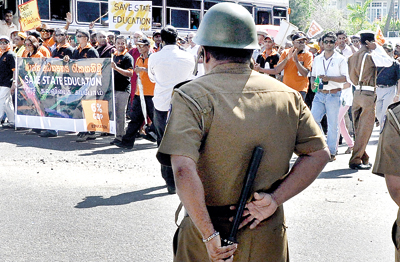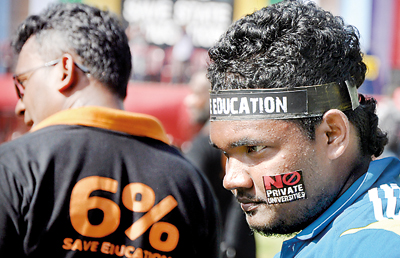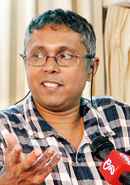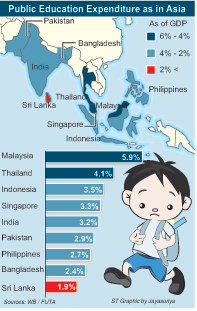News
The long march for education isn’t over
The long march, conducted over five days by academics and teachers from state universities across the country, climaxed when the protestors converged on Colombo on Friday evening. Joining the university teachers in a show of strength and support were hundreds representing student unions, trade unions, political parties and clergy.

Ready for action: A policeman on full alert as protestors converge on Hyde Park in Colombo on Friday. Pic by Mangala Weerasekera
The protestors and their supporters, who set out from Galle and Kandy on Monday, September 24, marched under the slogan “Save State Education”. They are calling on the Government to allocate a minimum 6 per cent of the country’s gross domestic product (GDP) to education.
This 6 per cent demand tops an agenda of nagging issues in local education.
In Galle, some 3,000 persons, including members of the Federation of University Teachers Association (FUTA) and academics from the South, started their march at the Dutch Fort. Travelling at a rate of 25 kilometres a day, and braving the elements – heavy rain in Hikkaduwa and sweltering hot days the rest of the way, they reached Colombo on Friday evening, where they held a mass rally at Hyde Park, Colombo.
UNP Kurunegala District MP Dayasiri Jayasekera, who joined the march at Kosgama, told the Sunday Times that he endorsed the university teachers’ demands. “If countries like Bangladesh can allocate more than 6 per cent to their country’s education, why can’t we? We joined the protest march to compel the Government to give a decent amount to education,” he said.
Along the way, several UNP and JVP Members of Parliament and members of the clergy joined the march. Among them were UNP MPs Kabir Hasim, Akila Viraj Kariawasam, Sujeewa Senasinghe and Lakshman Kiriella, John Amaratunge and JVP MP Sunil Handunnetti.
“This protest march is highly significant,” said FUTA media spokesman Dr. Mahim Mendis. “People from a variety of backgrounds have come together for a common cause, and that is to save state education. The State is obliged to protect education. The Government elected by the people should keep in mind that education is of supreme importance.”
In Kandy, the Inter-University Students Federation (IUSF) led a march that began on Monday the 24th and ended at the Lipton Circus, Colombo 7, on Friday the 28th. The students protestors and FUTA members led jointly addressed a public rally.IUSF convener Sanjeewa Bandara told the Sunday Times that the student union would continue its protests until the Government showed that it was serious about sustaining free education.

A face of determination. Pic by Indika Handuwala
Former Army Commander Sarath Fonseka, who also took part in the rally, told the Sunday Times that he endorsed FUTA’s demands. “The Government is cheating the people, there is corruption all over the country. This generation and future generations of students are entitled to a good education,” he said.
University students accompanying university dons at the rally said the protest would continue until the Government took remedial action.
University of Peradeniya engineering student Prabashana Priyantha said “the struggle will go on until the Government looked into the issues and started providing substantial and lasting solutions.”
University of Jayawardhanapura arts student Kamal Shashendra said he was against giving priority to private universities. “Those with minimal qualifications but with money attend these private tertiary institutions and graduate with degrees. The Government talks about admitting more students to state universities when the existing facilities are inadequate for the current students,” he said.
300 Kelaniya campus lecturers keen that classes continue
Not all academic staff at state-run higher education institutions are involved in the islandwide protest action, say members of the academic staff of the University of Kelaniya. Participation is not 100 per cent, they point out.
One non-participant is the Venerable Embogama Wimalag˝ana Thera, a senior lecturer in Sanskrit at the Kelaniya campus. “We are concerned about the students and their future, and that’s why we have not interrupted classes,” the Thera told the Sunday Times. Our first responsibility is to give students an education.”
Every year, according to the Thera, about 600,000 students sit for the GCE Ordinary Level, and of these only about 275,000 go on to take the GCE Advanced Level. Of these 275,000, only about 20,000 qualify to enter state universities. Getting a university place is a huge challenge for Sri Lanka’s educated young people who seek higher education credentials, he said.
Of the 535 Kelaniya campus lecturers, only 231 are involved in the strike action, said Prof. Mahendra Gunawardena, head of the Department of Science, University of Kelaniya. “A majority, 304 lecturers, are not involved,” he said.
Follow @timesonlinelk
comments powered by Disqus

















